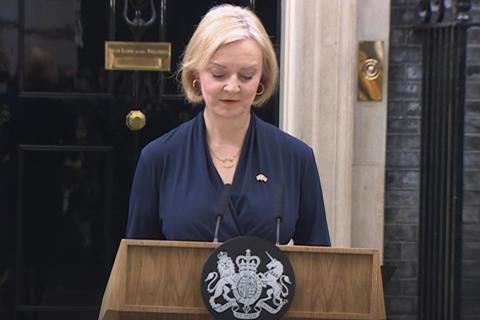Jeremy Hunt to stay as chancellor as new Conservative Party leader to be picked within the next week
Liz Truss became the shortest-serving prime minister in UK history after announcing her resignation as Conservative Party leader yesterday
Truss’ 45 days in office have been defined by economic and political turmoil, as markets crashed in response to her controversial mini-Budget.

Despite reversing many of the central measures of the so-called growth plan and replacing its architect, Kwasi Kwarteng, the past week has seen her political authority almost completely evaporate, with numerous Conservative MPs calling for her resignation.
“Given the situation, I cannot deliver the mandate on which I was elected by the Conservative Party,” said Truss, in a statement outside No 10 Downing Street.
Truss said she had informed the King of her decision and met with the chair of the 1922 committee, Sir Graham Brady, where they agreed that a leadership election would take place within the next week, with the prime minister remaining in post until a successor is chosen.
“This will ensure that we remain on a path to deliver our fiscal plans and maintain our country’s economic stability and national security,” Truss said.
The move means that the country will have a new prime minister – its third of the year – by the time the recently appointed chancellor Jeremy Hunt delivers the much-anticipated fiscal statement on 31 October.
Hunt has already reportedly confirmed he is not going to stand for the leadership and will remain as chancellor, with former chancellor Rishi Sunak and leader of the House of Commons Penny Mordaunt tipped as favourites to replace Truss.
Stocks rose in London on news of the statement, with the FTSE 250 index gaining 0.8%, and the pound rose above €1.12.
Leader of the opposition Sir Keir Starmer has called for an immediate general election, stating that the Conservative Party “has shown it no longer has a mandate to govern”. The Liberal Democrats made the same call.
Industry reaction
Simon Allford, president of the Royal Institute of British Architects:
“In a week’s time we’ll be ushering in the third Prime Minister of the year. This perpetually revolving door of ministers throws business certainty out the window, stifling hopes for recovery.
“The new Prime Minister’s agenda must prioritise finding real solutions to the real problems we face - the climate, energy and cost of living crises. These are unprecedented times of great uncertainty – we need stability.
“We will be engaging with the new Government and encouraging them to draw on the expertise in our industry, to help make our buildings and communities fit for the future.”
James Blakey, planning director at Moda Living:
“The politics of recent weeks has been extraordinary, but let’s remain optimistic that we can draw a line under it and move forwards. The UK is in desperate need of a stable government and a prime minister who will focus proactively on addressing the housing crisis which is impacting on so many lives.”
David Hopkins, chief executive of Timber Development UK:
“Political instability does no one any favours and it is vital we establish a stable government as soon as possible. In particular, we can’t let political turmoil damage crucial progress towards a net-zero construction industry following so much progress and investment in the past decade.
“This is an issue to which every part of the timber sector is currently committed and we have had positive conversations with new ministers only recently about how our sector can contribute to critical carbon reduction targets.
”Our hope is that a new prime minister does not mean a major reshuffle and yet another reset in ministerial appointments crucial to the construction industry. Following our commitment at COP26 to a 68% reduction in carbon emissions by 2030, a consistent policy environment is more important than ever.”
Stephen Marcos Jones, chief executive of the Association for Consultancy and Engineering:
“The backdrop of political uncertainty of the last few weeks has made it almost impossible for businesses to plan, further compounding the macro-economic challenges we are facing.
“It is vital that the process to appoint a new Prime Minister is both decisive and swift, and that we return to a more measured political environment which gives businesses full confidence in the decisions taken by our Government.
“With this in mind, we hope that the positive steps on expediating 100 infrastructure projects, the intention to simplify the planning process, and the establishment of new investment zones – previously announced in the fiscal statement – are maintained by the next Prime Minister and new Chancellor Jeremy Hunt. We look forward to seeing this confirmed at the Mini-Budget a week on Monday.”
Victoria Hills, chief executive of the Royal Town Planning Institute:
“The next Leader of the Conservative Party will need an effective and robust planning system to deliver affordable homes, public services and critical infrastructure. However, this can only be achieved by resourcing our planning system sufficiently.
“Planners cannot be expected to do more with less in perpetuity. Our members have shown resilience, and continuous, consistent dedication to their profession, but they are concerned that any continued uncertainty will delay plans and projects their communities need. Planning is one of the most important powers that local authorities have to improve residents’ lives. Without quality planning services, communities will miss opportunities to level up, deliver vital housing, and tackle climate change.
“We will strive to continue working with Government and the new Prime Minster to tackle the housing crisis, work to reach net zero and deliver for communities.”










No comments yet